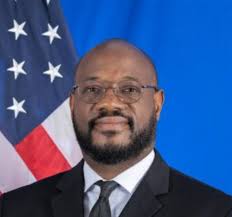The United States Ambassador to Ethiopia, Ervin Massinga, has softened his tone over recent criticisms of the Ethiopian government, calling instead for a political solution to the country’s ongoing internal conflicts. His remarks come after a controversial social media post was published and later retracted, sparking strong reactions.
During a press conference held on Thursday with a select group of journalists, Ambassador Massinga clarified that the earlier statement — which called on the Ethiopian government to halt drone strikes on civilians — was posted in error.
“It was a mistake. This was nothing more, nothing less than a mistake,” Massinga said. “We took an earlier draft, one that I had never really seen or approved, and due to an administrative error, it was unfortunately published. We then reverted back to the correct statement.”
Despite the confusion, the ambassador maintained a firm position on the urgency of dialogue, especially between the federal government and rebel groups such as Fano in the Amhara region, and the Oromo Liberation Army (OLA), also known as “Scheme,” in Oromia.
“We recognize that the current situation is not sustainable without a political resolution,” Massinga said. “I am positive and optimistic because the response from some factions such as the OLA and certain elements of Fano was encouraging. Of course, they presented long lists of preconditions, but we understand such preconditions are often for public consumption.”
He urged all sides to make concrete moves towards negotiations, saying, “At this point, both the federal government and the factions must find a way to make this more concrete.”
When asked whether the US was engaging the Ethiopian government directly, the ambassador confirmed ongoing diplomatic efforts.
“We will always have private discussions with the government about our desire and ideas on how this region can move forward rather than backward. However, much of our engagement will remain government-to-government in diplomatic contexts,” he explained.
Massinga also issued a strong warning against criminal elements hiding under political banners, saying, “There are individuals or groups who masquerade as freedom fighters but, in reality, are working for their own interests. This is a real tragedy. These groups prey upon some of the most vulnerable people in Ethiopia—engaging in kidnapping and various forms of criminality under the guise of a political struggle. This is a serious issue.”
On the broader US foreign policy approach, the ambassador noted that under the Trump administration, there was a deliberate shift to reduce the number of special envoys. Instead, embassies were encouraged to take the lead on foreign relations and policy development in host countries.
“We believe that engaging through embassies on the ground allows for deeper understanding and better coordination,” he said.
Addressing concerns over humanitarian support, Massinga reassured that most of the US aid programs in Ethiopia are still active.
“Specifically, 89% of humanitarian assistance that was previously programmed has been restored for continued implementation. This ensures that our government, in cooperation with key stakeholders and partners on the ground, can respond to and support internally displaced persons (IDPs) and vulnerable communities. This is something we consider very important,” he stated.
He also revealed that 77% of development and humanitarian funding remained available and would be used more efficiently, with a shift in focus.
“We are making a fundamental shift away from traditional programming and instead focusing on the private sector as the engine of growth—just as it is in our own country,” Massinga added.
As tensions persist in both Amhara and Oromia regions, and with the threat of more instability, the US is positioning itself as a strong advocate for peaceful resolution while maintaining essential humanitarian and development support for the Ethiopian people.
